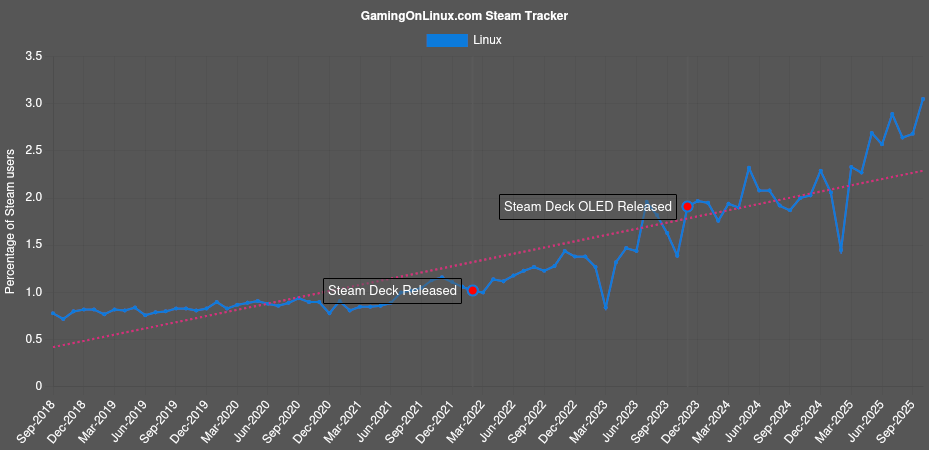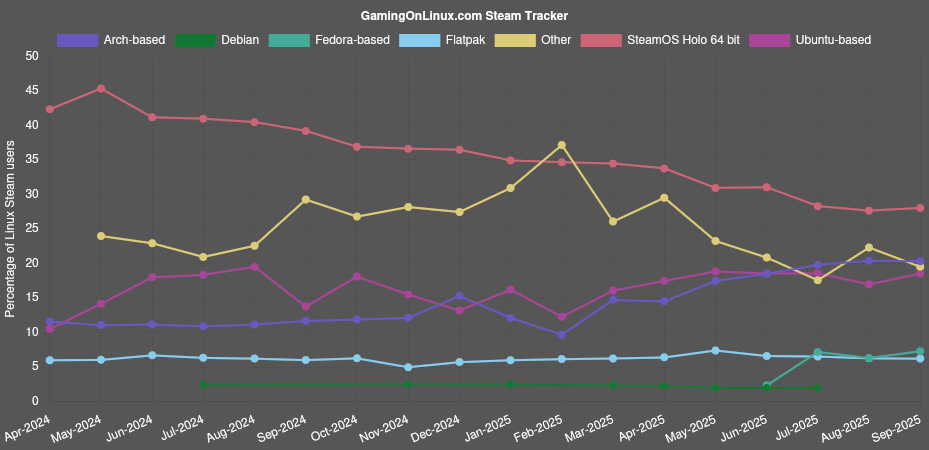It finally happened. Linux gamers on Steam as of the Steam Hardware & Software Survey for October 2025 have crossed over the elusive 3% mark. The trend has been clear for sometime, and with Windows 10 ending support, it was quite likely this was going to be the time for it to happen as more people try out Linux.
As of the October 2025 survey the operating system details:
- Windows 94.84% -0.75%
- Linux 3.05% +0.41%
- macOS 2.11% +0.34%
The snapshot chart from our dedicated Steam Tracker page shows the clear trend:
Overall, 3% might not seem like much to some, but again - that trend is very clear and equates to millions of people. The last time Valve officially gave a proper monthly active user count was in 2022, and we know Steam has grown a lot since then, but even going by that original number would put monthly active Linux users at well over 4 million. Sadly, Valve have not given out a more recent monthly active user number but it's likely a few million higher, especially with the Steam Deck selling millions.
And if we look at the distribution breakdown chart from our page:
The overall distribution numbers for October 2025:
- SteamOS Holo 64 bit - 27.18% (-0.47%)
- Arch Linux 64 bit - 10.32% (-0.66%)
- Linux Mint 22.2 64 bit - 6.65% (+6.65%)
- CachyOS 64 bit - 6.01% (+1.32%)
- Ubuntu Core 22 64 bit - 4.55% (+0.55%)
- Freedesktop SDK 25.08 (Flatpak runtime) 64 bit - 4.29% (+4.29%)
- Bazzite 64 bit - 4.24% (+4.24%)
- Ubuntu 24.04.3 LTS 64 bit - 3.70% (+3.70%)
- Linux Mint 22.1 64 bit - 2.56% (-5.65%)
- EndeavourOS Linux 64 bit - 2.32% (-0.08%)
- Freedesktop SDK 24.08 (Flatpak runtime) 64 bit - 2.31% (-3.98%)
- Fedora Linux 42 (KDE Plasma Desktop Edition) 64 bit - 2.12% (+0.19%)
- Manjaro Linux 64 bit - 2.04% (-0.31%)
- Pop!_OS 22.04 LTS 64 bit - 1.93% (-0.04%)
- Fedora Linux 42 (Workstation Edition) 64 bit - 1.75% (-0.43%)
- Other - 18.04% (-4.28%)
The numbers are still being massively pumped up by the Steam Deck with SteamOS Linux, which is not surprising considering that the Steam Deck is still in the top 10 of the global top sellers on Steam constantly. And with all the rumours and leaks surrounding the upcoming Steam Frame, which will hopefully be a SteamOS Linux powered VR kit, we could see the numbers just continue to jump higher.
Source: Valve
Bazzite is far more newbie friendly than Arch/CachyOS, and can be used for pretty much everything besides gamingI don't think so. Immutable distro puts a lot of restrictions on its use cases, so I wouldn't consider it pretty much for everything purpose. "User friendly" is a double edged if you simply can't do what you need.
More like "super restricted so you can't easily break things" - yeah. But that doesn't mean it suits all needs.
Last edited by Shmerl on 3 Nov 2025 at 5:32 pm UTC
Immutable distro puts a lot of restrictions on its use casesOf which the vast majority of normal users won't even notice.
Of which the vast majority of normal users won't even notice.That depends on what you call normal. Can you for example configure kernel modules there or immutability prevents that? Can you run stuff like VMs? "Normal" is too loose to describe it. I'd always see immutable distro as limiting and not general purpose enough.
If it covers your use cases - then it's useful. It is most fitting for console set ups in the gaming context.
Last edited by Shmerl on 3 Nov 2025 at 6:01 pm UTC
Last edited by Stella on 3 Nov 2025 at 7:16 pm UTC
* General development needs: A mutable distro in a container is actually a reasonable solution. Distrobox makes it easy to create a containerized distro in which you can install development tools. You can use GUI apps in a container on the host distro and share your /home folder.
* Installing RPMs that need system level access: RPMs need a process called "layering" which generates a new image with each package you install. Installing packages is advertised as a last resort because doing so can increase update times or completely halt updates, similar to having to remove PPAs on Ubuntu before a version upgrade.
* Kernel Modules: Bazzite comes with more kernel modules than most distros. Kernel modules for Xbox controllers, Broadcom Wi-Fi and a few other ones are included. If a kernel module you need is not there, you will need to create a "custom image" that bundles the kernel module you need. Layering will not work. Custom image is basically creating a new definition that is based on Bazzite and changing your source to a repository on GitHub.
I'm actually affected by this, a maintainer refuses to include a modified module for fan control on Gigabyte motherboards due to safety concerns.
* Virtual machines: Qemu and virt-manager are installed, USB and GPU passthrough can be configured via a "ujust" script. Virtualbox with acceleration will not work because its kernel module cannot be installed.
* Remote Desktop: Sunshine is preinstalled.
* Remote Access: Tailscale and SSH are preinstalled.
* VPNs: Installing a VPN that has a flatpak is recommended yet there are only 2 lol. Proton VPN and Mozilla's VPN. An alternative is downloading an OpenVPN or Wireguard configuration and importing it to NetworkManager. This is rather uncommon but is a simple process can be done entirely with a GUI. If your VPN provider gives you the conf files. Layering as a "last resort" is also possible, except that flatpak and conf files barely cover most people's needs regarding VPNs.
* DEs other than GNOME and Plasma: Custom image, see kernel modules above.
* 3rd party software that assumes host system is modifiable: Tough luck. Patch the software.
I'm not really sold on immutable distros for normal desktop use cases anyway, I don't see a major benefit in losing flexibility for general purpose needs. So far the only case where I'm using one is with [OpenWRT](https://en.wikipedia.org/wiki/OpenWrt) for my router. Immutability makes sense there due to special installation requirements on the embedded devices. Customization with packages there is possible using overlayfs. It doesn't need to generate a new image, it keeps immutable components separate from installed packages.
If a kernel module you need is not there, you will need to create a "custom image" that bundles the kernel module you need.Which sort of starts defeating the purpose of using such approach. It's easier to build just a module than to build a whole new image to use a single module.
Last edited by Shmerl on 4 Nov 2025 at 1:27 am UTC
I cannot comment on Bazzite. I was talking about Steam being a gaming site, but many Steam users probably still using their PC for many things, not only gaming.I'm using Steam and I'm using my (Linux) PC for many other things, and I bet that's the case for most of us. So yes, I think their point is valid.No it's not, because Bazzite is far more [...]
The container acts like a regular distro so you can sudo apt install or sudo pacman -S and changes will survive unlike docker.Docker does the same. Just don't purge the container. They are all different ways of working with containers. Containers work the same.
Any ideas why SteamOS is at 27% while Custom GPU 0405 is at 14%?The GPU 0405 (14.17%) is only the LCD.
The OLED is AMD Radeon Graphics (RADV VANGOGH) with 12.64%
So steam deck gpu is 26.81% and this is very close to SteamOS (27.18%)












 How to setup OpenMW for modern Morrowind on Linux / SteamOS and Steam Deck
How to setup OpenMW for modern Morrowind on Linux / SteamOS and Steam Deck How to install Hollow Knight: Silksong mods on Linux, SteamOS and Steam Deck
How to install Hollow Knight: Silksong mods on Linux, SteamOS and Steam Deck